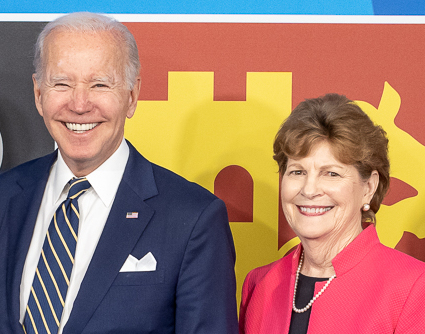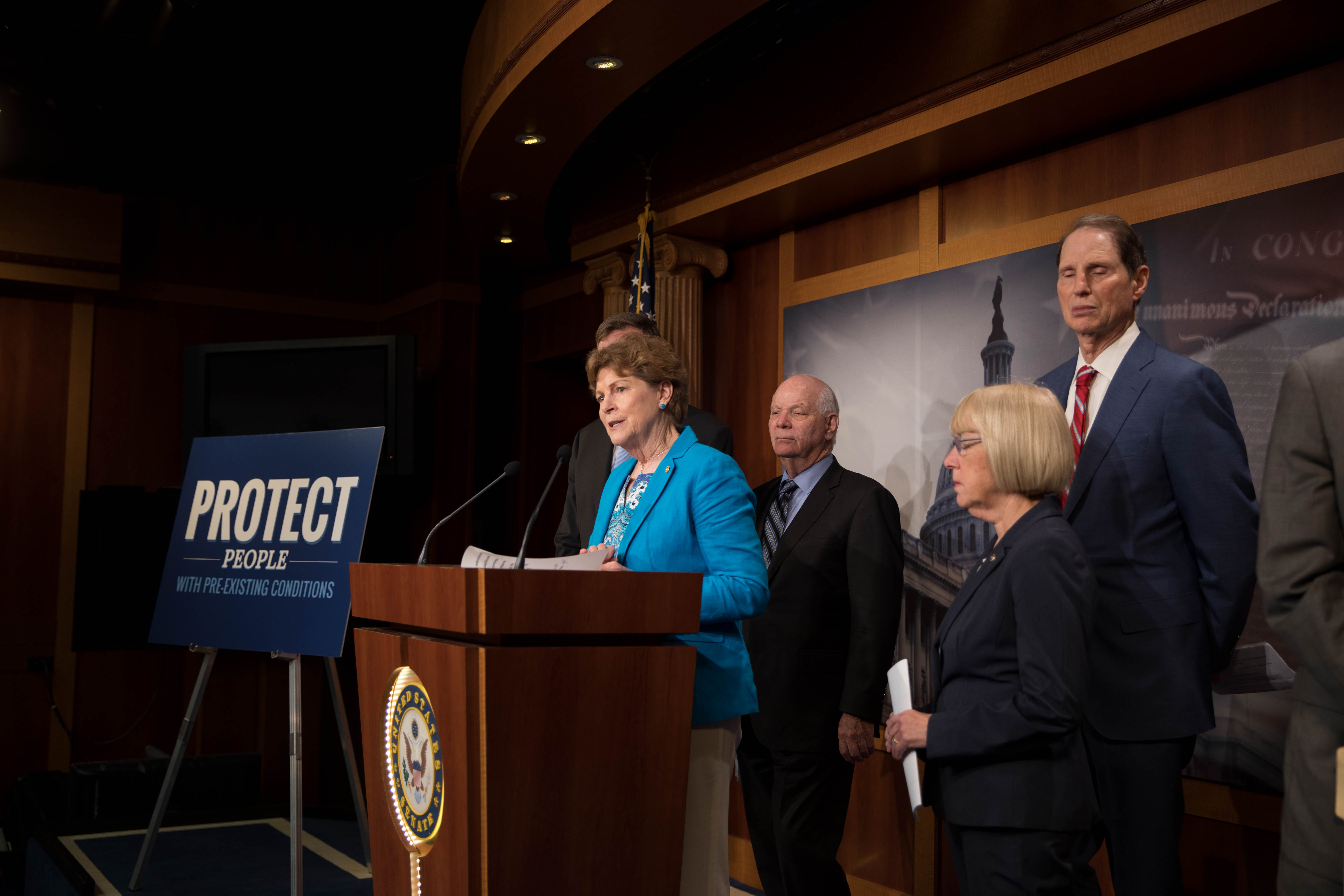1. Overview
Cynthia Jeanne Shaheen, born on January 28, 1947, is an American politician and former educator who has served as the senior United States Senator from New Hampshire since 2009. A prominent member of the Democratic Party, Shaheen holds a significant place in American political history as the first woman elected as both a governor and a U.S. senator, and the first woman elected governor of New Hampshire. Her career reflects a commitment to public service, marked by her tenure as the 78th Governor of New Hampshire from 1997 to 2003, followed by her impactful work in the U.S. Senate where she has focused on healthcare, economic development, and foreign policy. She is currently the dean of New Hampshire's congressional delegation.
2. Early life and background
Jeanne Shaheen's formative years laid the groundwork for her eventual career in public service, encompassing her education and initial professional endeavors before entering the political arena.
2.1. Childhood and education
Born Cynthia Jeanne Bowers in St. Charles, Missouri, on January 28, 1947, Shaheen is the daughter of Belle Ernestine (Stillings) and Ivan E. Bowers. She completed her high school education in Selinsgrove, Pennsylvania. She pursued higher education, earning a bachelor's degree in English from Shippensburg University of Pennsylvania and a master's degree in political science from the University of Mississippi.
2.2. Early career and activities
Before embarking on her political journey, Shaheen began her professional life as an educator, teaching high school in Mississippi. In 1973, she relocated to New Hampshire, where she continued to teach school. Alongside her husband, Bill Shaheen, an attorney and judge, she also co-owned a store specializing in used jewelry. The couple has three children. In April 2005, Shaheen was appointed director of the Harvard Institute of Politics, a position she held until September 2007 when she resigned to pursue a U.S. Senate bid.
3. Political career
Jeanne Shaheen's political career spans several decades, beginning at the state level in New Hampshire and culminating in her current role as a United States Senator, marking a path of pioneering achievements for women in American politics.
3.1. Early political activities
As a member of the Democratic Party, Shaheen became involved in political campaigns early in her career. She contributed to Jimmy Carter's 1976 presidential campaign and served as the New Hampshire campaign manager for Gary Hart in 1984. Her direct involvement in elected office began in 1990 when she successfully ran for a seat in the New Hampshire Senate representing the 21st district. She served two terms in the state Senate, gaining valuable legislative experience that prepared her for higher executive and federal roles.
3.2. Governor of New Hampshire
Shaheen's tenure as Governor of New Hampshire was marked by her efforts to address critical state issues, particularly education funding and tax reform, and her historic achievement as the state's first female governor.
Her decision to run for governor in 1996 followed the retirement of Republican Governor Steve Merrill. In the election, she faced Ovide M. Lamontagne, who was then the chairman of the State Board of Education. Shaheen campaigned as a moderate, focusing heavily on education funding issues and pledging to expand kindergarten programs. She secured a decisive victory, defeating Lamontagne with 57% of the vote to his 40%. This election made her the first woman to be elected governor of New Hampshire, a significant milestone, although Vesta M. Roy had previously served as acting governor for a brief period in 1982-1983.
In 1998, Shaheen was reelected by an even larger margin, securing 66% of the vote against her opponent's 31%. During both her 1996 and 1998 campaigns, Shaheen had taken a "no-new-taxes" pledge. However, following a court decision that significantly altered how education was funded, primarily by local taxes, her administration developed a plan that aimed to increase education spending and introduce a statewide property tax.
When running for her third term in 2000, Shaheen notably chose not to renew her "no-new-taxes" pledge, becoming the first New Hampshire governor in 38 years to win an election without making such a commitment. Her preferred solution for the school-funding challenge was not a broad-based tax but rather the legalization of video-gambling at state racetracks, a proposal that was consistently rejected by the state legislature. In 2001, she attempted to implement a 2.5% sales tax, which would have been the first broad-based tariff of its kind in New Hampshire, a state historically without a sales tax; this proposal was also rejected by the state legislature. Additionally, she proposed an increase in the state's cigarette tax and a 4.5% capital gains tax.
3.3. Presidential politics
Shaheen played active roles in national presidential campaigns, particularly for Democratic candidates, influencing the national political landscape.
In the 2000 Democratic Party presidential primaries, Shaheen was a strong supporter of Al Gore, with her husband managing Gore's New Hampshire campaign. Their efforts were instrumental in helping Gore secure a narrow victory in the New Hampshire primary against Bill Bradley. Due to her significant contributions, Gore included Shaheen on his short list of potential vice presidential nominees. However, Shaheen publicly stated she was not interested in the position.
After a period of teaching at Harvard University and a fellowship at the Institute of Politics, Shaheen was named the national chairperson for John Kerry's 2004 presidential campaign in September 2003, further solidifying her influence in national Democratic politics.
3.4. U.S. Senate
Jeanne Shaheen's career in the U.S. Senate has been marked by several hard-fought election campaigns and a dedicated focus on legislative work and committee assignments that shape national policy.
3.4.1. Elections
After serving three two-year terms as governor, Shaheen opted not to seek a fourth term, instead deciding to run for the U.S. Senate in 2002. She faced Republican nominee John E. Sununu in a closely contested race, ultimately losing by a margin of 51% to 47%. Shaheen later indicated that her loss was partly due to public discussion and Republican advertisements criticizing her gubernatorial record, particularly her support for a sales tax ballot initiative and perceived failures in the state's schools.
The 2002 election was also marred by a phone-jamming scandal. In June 2004, former Republican consultant Allen Raymond pleaded guilty to jamming Democratic Party phone lines intended to encourage voter turnout. He was sentenced to five months in jail in February 2005. Charles McGee, the former state GOP executive director, received a seven-month sentence for his involvement. Raymond alleged that James Tobin, the Northeast field director for the National Republican Senatorial Committee, orchestrated the scheme. Tobin was convicted of federal felonies in December 2005 and sentenced to ten months, but his conviction was later reversed on appeal. New felony indictments were filed against Tobin in October 2008, alleging he lied to an FBI agent about his role, but these charges were dismissed in 2009 by a federal judge who found them to be "vindictive prosecution."
In 2008, Shaheen ran for the U.S. Senate again, setting up a rematch with John E. Sununu. Early polls indicated a strong lead for Shaheen, suggesting she was the most viable Democratic candidate to defeat Sununu. After meeting with Senate Majority Leader Harry Reid and Democratic Senatorial Campaign Committee Chairman Chuck Schumer, who assured her of strong support, Shaheen officially announced her candidacy on September 14, 2007, from her home in Madbury, New Hampshire. Her campaign received an early endorsement from EMILY's List. Shaheen ultimately defeated Sununu, winning 52% of the vote to his 45%. Her victory marked a historic moment, as she became the first Democratic senator from New Hampshire since John A. Durkin, who was defeated in 1980.


In 2020, Shaheen was reelected to a third term, defeating Republican nominee Bryant "Corky" Messner with 57% of the vote to his 41%. This made her the first New Hampshire Democrat elected to three full terms in the Senate, further solidifying her enduring political influence in the state.
3.4.2. Tenure and committee assignments
Jeanne Shaheen was sworn into the United States Senate on January 3, 2009. During her tenure, she has been an active legislator, sponsoring 288 bills, five of which have become law.
On January 6, 2021, Shaheen was participating in the certification of the 2021 United States Electoral College vote count when the U.S. Capitol was attacked by supporters of then-President Trump. During the attack, she confirmed her safety and that of her staff via social media, asserting, "We will not be stopped from doing our Constitutional duty." The day after the attack, Shaheen publicly stated that she considered Trump "unfit for office" and expressed her support for his impeachment and removal from office. In 2024, Shaheen was recognized as one of the top 10 most bipartisan senators, highlighting her ability to work across the political aisle.

Shaheen holds several significant committee assignments in the Senate:
- Committee on Appropriations:
- Chair of the Subcommittee on Commerce, Justice, Science, and Related Agencies
- Subcommittee on Defense
- Subcommittee on Energy and Water Development
- Subcommittee on Homeland Security
- Subcommittee on Labor, Health and Human Services, Education, and Related Agencies
- Subcommittee on the Department of State, Foreign Operations, and Related Programs
- Committee on Armed Services:
- Subcommittee on Emerging Threats and Capabilities
- Subcommittee on Readiness and Management Support
- Subcommittee on Seapower
- Committee on Foreign Relations:
- Subcommittee on European Affairs
- Subcommittee on International Operations and Organizations, Human Rights, Democracy and Global Women's Issues
- Subcommittee on Near Eastern and South and Central Asian Affairs
- Committee on Small Business (Chair)
- Select Committee on Ethics
- Commission on Security and Cooperation in Europe


Her caucus memberships include the Afterschool Caucuses, the Senate Taiwan Caucus, and she serves as co-chair of the Senate National Guard Caucus.
4. Political positions
Jeanne Shaheen's political positions reflect her commitment to progressive policies, emphasizing social impact, equity, and a pragmatic approach to governance.
4.1. Health care
Shaheen has been a strong advocate for accessible and affordable healthcare. In 2009, she collaborated with U.S. Senator Susan Collins to introduce the Medicare Transitional Care Act. This legislation aimed to provide crucial follow-up care for hospital patients after discharge, with the goal of reducing re-hospitalizations. The bill successfully passed in 2010, and subsequent research projected that this measure could lower healthcare costs by as much as 5.00 K USD per Medicare beneficiary while simultaneously enhancing healthcare quality and decreasing readmission rates.
In December 2009, Shaheen voted in favor of the Patient Protection and Affordable Care Act (PPACA), commonly known as the Affordable Care Act or Obamacare. Prior to the rollout of the PPACA, Shaheen had stated that individuals who liked their existing health insurance plans would be able to keep them. However, when confronted with instances of individuals losing their plans due to the PPACA, she clarified that people could retain their healthcare plans if they were "willing to pay more."
In August 2019, Shaheen was among 19 senators who signed a letter to then-United States Secretary of the Treasury Steven Mnuchin and United States Secretary of Health and Human Services Alex Azar. The letter requested data from the Trump administration to help states and Congress understand the potential ramifications of the Texas v. United States Affordable Care Act lawsuit. The senators warned that an overhaul of the existing healthcare system would create "an enormous hole in the pocketbooks of the people we serve as well as wreck state budgets." In October 2019, Shaheen was also one of 27 senators to advocate for the passage of the Community Health Investment, Modernization, and Excellence (CHIME) Act, which was set to expire the following month. The senators cautioned that if funding for the Community Health Center Fund (CHCF) lapsed, it could lead to an estimated 2,400 site closures, 47,000 job losses, and jeopardize the healthcare access for approximately 9 million Americans.

4.2. Fiscal policy
Shaheen's approach to fiscal matters has involved advocating for investments in infrastructure and social programs, while also engaging in the complexities of budget and taxation. On October 11, 2011, she supported a proposed bill that included 446.00 B USD in spending for infrastructure and schools, provided funding for state and local governments, and extended the payroll tax deduction. This spending was intended to be financed by a 5.6% surtax on incomes exceeding 1.00 M USD. However, the bill failed to pass.
She has also utilized legislative tools such as earmarks to secure funding for projects in New Hampshire. For instance, she used an earmark in a large appropriations bill to restore funding for a federal prison in Berlin, New Hampshire, despite a recommended cut of 276.00 M USD.
4.3. Gun policy
Shaheen supports stricter gun control measures aimed at enhancing public safety. She advocates for making it illegal for individuals on the terrorist watchlist to purchase firearms. She has voted in favor of legislation proposing to expand background checks for gun purchases and has also supported banning magazines with a capacity of over 10 bullets. In 2016, following the Orlando nightclub shooting, Shaheen participated in the Chris Murphy gun control filibuster, emphasizing that "moments of sympathy are not enough" and calling for the enactment of common-sense gun laws to prevent future tragedies.
4.4. Energy and environmental policy
Shaheen's policies on energy and the environment prioritize sustainable practices and robust regulatory oversight to mitigate societal and economic consequences of environmental disasters. Following the Deepwater Horizon oil spill in the Gulf of Mexico in 2010, Shaheen proposed the abolition of the Minerals Management Service, the U.S. government agency responsible for regulating offshore drilling. She argued that past reform efforts had been insufficient and that a new agency was necessary to ensure effective oversight. Shaheen also introduced legislation to grant the president's bipartisan BP Oil Spill Commission subpoena power for its investigation. She asserted that such power was essential to prevent future disasters, highlighting the significant economic costs incurred by the Gulf Coast region and the broader economy due to the spill.
In April 2014, Shaheen introduced the Energy Savings and Industrial Competitiveness Act of 2014 (S. 2262; 113th Congress), a bill designed to improve efficient energy use across various sectors. In March 2019, she was an original cosponsor of a bipartisan bill that aimed to mandate the Environmental Protection Agency (EPA) to declare per- and polyfluoroalkyl substances (PFAS) as hazardous substances. This designation would allow them to be addressed with cleanup funds via the EPA's Superfund law, requiring polluters to undertake or pay for remediation within a year of the bill's enactment. Shaheen has also expressed opposition to the Nord Stream 2, a controversial pipeline intended to deliver natural gas from Russia to Germany.
4.5. Foreign and defense policy
Shaheen's views on international relations and national security have evolved, reflecting a critical perspective on military interventions and a focus on human rights and diplomacy. In 2002, during her first U.S. Senate campaign, Shaheen supported both the 2003 invasion of Iraq and the policy of "regime change" for Iraq, a stance she adopted after discussions with former Clinton-administration National Security Advisor Sandy Berger. At the time, this issue was considered minor in her campaign.
However, her perspective shifted, and in September 2004, while serving as chair of the Kerry presidential campaign, she publicly questioned George W. Bush's handling of the situation in Iraq. She stated that Bush had "misled us into war in Iraq" and that the war "has not made us safer and more secure at home." She further criticized the administration, noting, "You know, we have not stabilized Afghanistan. We have not stabilized Iraq. There is no plan to win the peace." In a C-SPAN interview on July 28, 2004, she elaborated, asserting that Bush's justifications for war-the presence of weapons of mass destruction and ties to al-Qaeda-were not substantiated. She emphasized that while there was an effort to make the American people believe in a connection, "the fact is that's not true."

Regarding the War in Afghanistan, Shaheen opposed the 2021 withdrawal of U.S. troops from Afghanistan under President Joe Biden, expressing reservations about the decision.
4.6. Social policy
Shaheen's positions on social issues reflect her evolving views and support for policies promoting social equity and protecting minority rights.
On LGBT rights, Shaheen's stance has progressed over time. While she initially opposed same-sex marriage during her tenure as governor of New Hampshire, by 2009, she publicly supported marriage for same-sex couples and became a sponsor of the Respect for Marriage Act. She also voted in favor of the repeal of Don't ask, don't tell, which ended the ban on openly gay, lesbian, and bisexual people serving in the military. Furthermore, she supports government recognition of same-sex spouses of military and other government personnel, advocating for equal rights and benefits.
Regarding the minimum wage, on March 5, 2021, Shaheen voted against Bernie Sanders's amendment to include a 15 USD/hour minimum wage in the American Rescue Plan Act of 2021.
On immigration, in 2025, Shaheen was one of 12 Senate Democrats who joined all Republicans in voting for the Laken Riley Act.
5. Electoral history
Jeanne Shaheen's electoral career includes multiple successful campaigns for both Governor of New Hampshire and United States Senator.
Governor elections in New Hampshire: Results 1996-2000
| Year | Democratic | Votes | Pct | Republican | Votes | Pct | 3rd Party | Party | Votes | Pct | 3rd Party | Party | Votes | Pct |
|---|---|---|---|---|---|---|---|---|---|---|---|---|---|---|
| 1996 | Jeanne Shaheen | 284,175 | 57% | Ovide Lamontagne | 196,321 | 40% | Fred Bramante | Independent Reform | 10,316 | 2% | Robert Kingsbury | Libertarian | 5,974 | 1% |
| 1998 | Jeanne Shaheen (inc.) | 210,769 | 66% | Jay Lucas | 98,473 | 31% | Ken Blevens | Libertarian | 8,655 | 3% | Write-ins | Write-ins | 503 | <1% |
| 2000 | Jeanne Shaheen (inc.) | 275,038 | 49% | Gordon Humphrey | 246,952 | 44% | Mary Brown | Independent | 35,904 | 6% | John Babiarz | Libertarian | 6,446 | 1% |
U.S. Senate (Class II) elections in New Hampshire: Results 2002-2020
| Year | Democratic | Votes | Pct | Republican | Votes | Pct | 3rd Party | Party | Votes | Pct | 3rd Party | Party | Votes | Pct |
|---|---|---|---|---|---|---|---|---|---|---|---|---|---|---|
| 2002 | Jeanne Shaheen | 207,478 | 46% | John E. Sununu | 227,229 | 51% | Ken Blevens | Libertarian | 9,835 | 2% | Bob Smith | Write-in | 2,396 | 1% |
| 2008 | Jeanne Shaheen | 358,947 | 52% | John E. Sununu (inc.) | 314,412 | 45% | Ken Blevens | Libertarian | 21,381 | 3% | ||||
| 2014 | Jeanne Shaheen (inc.) | 251,184 | 51% | Scott Brown | 235,347 | 48% | ||||||||
| 2020 | Jeanne Shaheen (inc.) | 450,771 | 57% | Corky Messner | 326,229 | 41% | Justin O'Donnell | Libertarian | 18,421 | 2% |
Write-in and minor candidate notes: In 2002, write-ins received 197 votes.
Primaries
| New Hampshire Governor Democratic primary election, 1996 | |||
|---|---|---|---|
| Party | Candidate | Votes | % |
| Democratic | Jeanne Shaheen | 52,238 | 88% |
| Democratic | Lovett | 4,286 | 7% |
| Democratic | Woodworth | 2,609 | 4% |
| New Hampshire Governor Democratic primary election, 2000 | |||
|---|---|---|---|
| Party | Candidate | Votes | % |
| Democratic | Jeanne Shaheen (inc.) | 45,249 | 60% |
| Democratic | Mark Fernald | 28,488 | 38% |
| U.S. Senate Democratic primary election in New Hampshire, 2008 | |||
|---|---|---|---|
| Party | Candidate | Votes | % |
| Democratic | Jeanne Shaheen | 43,968 | 89% |
| Democratic | Raymond Stebbins | 5,281 | 11% |
6. Impact and evaluation
Jeanne Shaheen's political career has left a significant and lasting impact on American society and public discourse, particularly through her pioneering role as a woman in politics and her legislative contributions. As the first woman to be elected governor of New Hampshire and the first woman in U.S. history to be elected as both a governor and a U.S. senator, she broke significant barriers and paved the way for future generations of female leaders. Her sustained success in multiple statewide elections, including three terms as governor and three terms as a U.S. Senator, underscores her enduring appeal and effectiveness as a public servant.
Throughout her career, Shaheen has consistently championed policies aimed at improving the lives of her constituents and promoting social equity. Her efforts in healthcare, such as the Medicare Transitional Care Act, demonstrate a commitment to practical solutions that enhance access and affordability, particularly for vulnerable populations. In fiscal policy, while navigating the complexities of state budgets, she has advocated for investments in public services like education and infrastructure. Her strong stance on gun control, including support for expanded background checks and restrictions on high-capacity magazines, reflects a dedication to public safety.
On environmental issues, Shaheen has actively sought to protect natural resources and promote sustainable practices, as evidenced by her proposals following the Deepwater Horizon oil spill and her support for energy efficiency and PFAS remediation. In foreign policy, her critical re-evaluation of the Iraq War and her opposition to the Afghanistan withdrawal highlight a nuanced and principled approach to international relations, prioritizing human rights and diplomatic considerations. Her evolving views on social issues, notably her support for same-sex marriage and LGBT rights, demonstrate a responsiveness to societal changes and a commitment to inclusivity.
Shaheen's ability to work across the political aisle, as recognized by her ranking among the most bipartisan senators in 2024, further underscores her effectiveness in a divided political landscape. Her career exemplifies a dedication to democratic principles and a focus on practical, impactful legislation, solidifying her legacy as a significant figure in American politics.